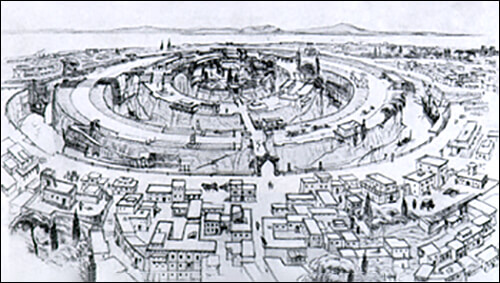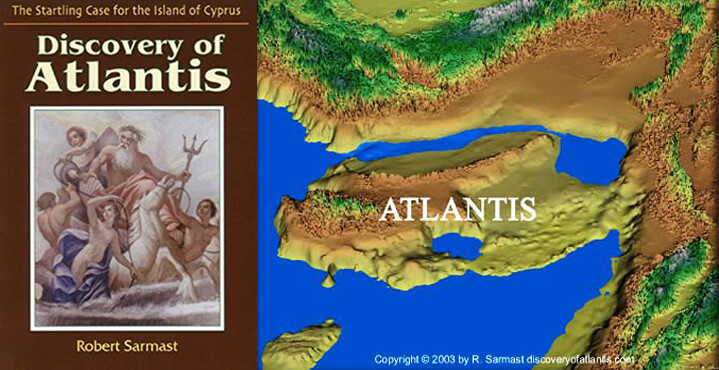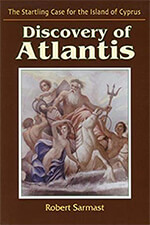Atlantis-Eden Parallels
MORE ASTRONOMY / ARCHAEOLOGY / COSMOLOGY
- Architecture of the Universe and the Urantia Book
- Stars, Galaxies, Superuniverses and the Urantia Book
- Monmatia Revisited
- Earth-Moon Evolution
- A Tale of Two Orvontons
- Urantia, 606 of Satania
- Urantia, A Cosmic View of the Architecture of the Universe
- Jesus the Boatbuilder and the Ancient Boat
- Ancient Cyprus
- Did the Jews Really Not Bury Their Dead?
- Atlantis-Eden Parallels
- First Eden/Atlantis Analysis
The similarities between Plato's ATLANTIS and
the Urantia Book's GARDEN OF EDEN
compiled by Robert Sarmast (2003)
[A] long narrow peninsula—almost an island—projecting westward from the eastern shores of the Mediterranean Sea....The coast line of this land mass was considerably elevated, and the neck connecting with the mainland was only twenty-seven miles wide at the narrowest point. [UB 823]
| Plato's Critias | The Urantia Book | |
| Poseidon descended from the heavens to his island/peninsula home [the original Greek word is nesos, which can mean either island or peninsula], Atlantis. Plato’s story of Atlantis was imported from Egypt, and the legend centers on events taking place primarily in the eastern Mediterranean. | Adam and Eve materialized on Eden peninsula “[Eden was] a long narrow peninsula—almost an island—projecting westward from the eastern shores of the Mediterranean Sea … This area was virtually an island in an inland sea.” | |
| “To begin with the region as a whole [whole island of Atlantis] was said to be high above the level of the sea, from which it rose precipitously.” | “The coast line of this land mass [whole island of Eden] was considerably elevated.” | |
| Atlantis island/peninsula had a “greatest length.” | The Eden peninsula was “long and narrow.” | |
| [Atlantis proper or the “plain”] “received the streams which came down from the mountains.” | “The great river that watered the Garden [Eden proper] came down from the higher lands of the peninsula.” | |
| Atlantis proper was in a valley, surrounded by mountains which “came right down to the sea.” This would deprive it of rain which is why the Atlanteans had to collect water from mountain streams. | “While it rained copiously on the surrounding highlands, it seldom rained in Eden proper.” Eden proper was sheltered from the sea by “coastal hills.” | |
| Midway along the greatest length of Atlantis and “near the sea, was a plain, said to be the most beautiful and fertile of all plains.” |
“The site chosen for the Garden was probably the most beautiful spot of its kind in all the world, and the climate was then ideal. Nowhere else was there a location which could have lent itself so perfectly to becoming such a paradise of botanic expression.” | |
| “The mountains which surrounded it [Atlantis] were celebrated as being more numerous, higher and more beautiful than any which exist today.” | “[The] stabilized weather [of Eden] was due to the encircling mountains.” |

Atlantis' capital city, based on Plato's description. Illustration from
Albert Herrmann's Unsere Ahnen und Atlanten, 1934
Albert Herrmann's Unsere Ahnen und Atlanten, 1934
| Atlantis had precious gems, gold, silver, copper and tin. | “The mountains surrounding the Garden abounded in precious stones and metals ...” |
|
| “In the center was a shrine sacred to Poseidon and Cleito [temple of Zeus], surrounded by a golden wall through which entry was forbidden.” | “At the center of the Edenic peninsula [central sector] was the exquisite stone temple of the Universal Father, the sacred shrine of the Garden.” | |
| “As to the population, each of the lots in the plain had to find a leader for the men who were fit for military service, and the size of a lot was a square of ten stadia each way, and the total number of all the lots was sixty thousand. And of the inhabitants of the mountains and of the rest of the country there was also a vast multitude, which was distributed among the lots and had leaders assigned to them according to their districts and villages.” | “To the north the administrative headquarters was established; to the south were built the homes for the workers and their families; to the west was provided the allotment of ground for the proposed schools of the educational system of the expected Son, while in the ‘east of Eden’ were built the domiciles intended for the promised Son and his immediate offspring. The architectural plans for Eden provided homes and abundant land for one million human beings.” | |
| “They [the Atlanteans] had two harvests a year … which the channels, fed by the rivers, provided irrigation.” The irrigation reportedly covered thousands of miles. | “[Eden] had thousands of miles of irrigation ditches.” | |
| “[Atlantis] bore freely all the fragrant things there now are in the earth, roots, herbs, bushes and gums exuded by flowers or fruit. There were cultivated crops, cereals ... all these that sacred island ... brought forth fair and wondrous and in infinite abundance.” | “By the time of Adam’s arrival most of the plants of that section of the world were growing in Eden. Already had many of the fruits, cereals, and nuts been greatly improved. Many modern vegetables and cereals were first cultivated here…The trees and plants [on Eden] were almost beyond number…” | |
| “[Poseidon] equipped the central island with godlike lavishness … he caused the earth to grow abundant produce of every kind.” | “[D]uring the early days of his [Adam’s] sojourn in Eden the whole Garden took on new form and assumed new proportions of beauty and grandeur.” | |
| “Some of their buildings were simple, but in others they put together different stones, varying the color to please the eye, and to be a natural source of delight.” | “And though the structures of the Garden were simple, they were most artistic.” | |
| “They [the Atlanteans] bore the burden of their wealth and possessions lightly, and did not let their high standard of living intoxicate them or make them lose their self-control, but saw soberly and clearly that all these things flourish only in a soil of common goodwill and individual character, and if pursued too eagerly and overvalued destroy themselves and morality with them.” | “The mountains surrounding the Garden abounded in precious stones and metals, though these received very little attention. The dominant idea was to be the glorification of horticulture and the exaltation of agriculture.” | |
| “At a later time there were earthquakes and floods of extraordinary violence, and in a single dreadful day and night all your fighting men [in the eastern Mediterranean area] were swallowed up by the earth, and the island of Atlantis was similarly swallowed up by thesea and vanished….” | “[I]n connection with the violent activity of the surrounding volcanoes and the submergence of the Sicilian land bridge to Africa, the eastern floor of the Mediterranean Sea sank, carrying down beneath the waters the whole of the Edenic peninsula.” | |
| General theme of the legend of Atlantis: The Atlanteans were a superior race descended from Poseidon’s lineage, who lived on an island/peninsula in peace and harmony. They were wise and powerful but lived in modest homes and generously gave the gifts of civilization to neighboring tribes. They were religious and ruled with wisdom over a vast area, gradually increasing their numbers while keeping their blood pure. Eventually they mated with the natives and lost their special genetic character, becoming more and more like human beings and finally disappearing as a distinct race. Their island was later destroyed by earthquakes, the sinking of the eastern Mediterranean basin, and a flood. |
General theme of the Urantia Book’s Eden: The Adamites were a superior race descended from Adam’s lineage, who lived on an island/peninsula in peace and harmony. They were wise and powerful but lived in modest homes and generously gave the gifts of civilization to neighboring tribes. They were religious and ruled with wisdom over a vast area, gradually increasing their numbers while keeping their blood pure. Eventually they mated with the natives and lost their special genetic character, becoming more and more like human beings and finally disappearing as a distinct race. Their island was later destroyed by earthquakes, the sinking of the eastern Mediterranean basin, and a flood. | |
| The story of Atlantis originates from the records of the high priests of Egypt, who claimed that they had religiously guarded the legend for about ten thousand years. | The story of the first Eden was passed down by the Andites and 10% of their race settled in Egypt about ten thousand years ago. They became the priests and rulers of the land. |
For more information, you can purchase Robert Sarmast's book, DISCOVERY OF ATLANTIS. In this book Sarmast joins robust empiracal data with other unique findings in ancient history, world mythology, and natural history. Each new fact he marshals makes the case for the island of Cyprus increasingly plausible. With this entirely original theory, Sarmast brings the legendary island of Atlantis alive in a way that will thrill Atlantology fans or anyone who has ever wondered about the most persistent mystery of the ancient world.



